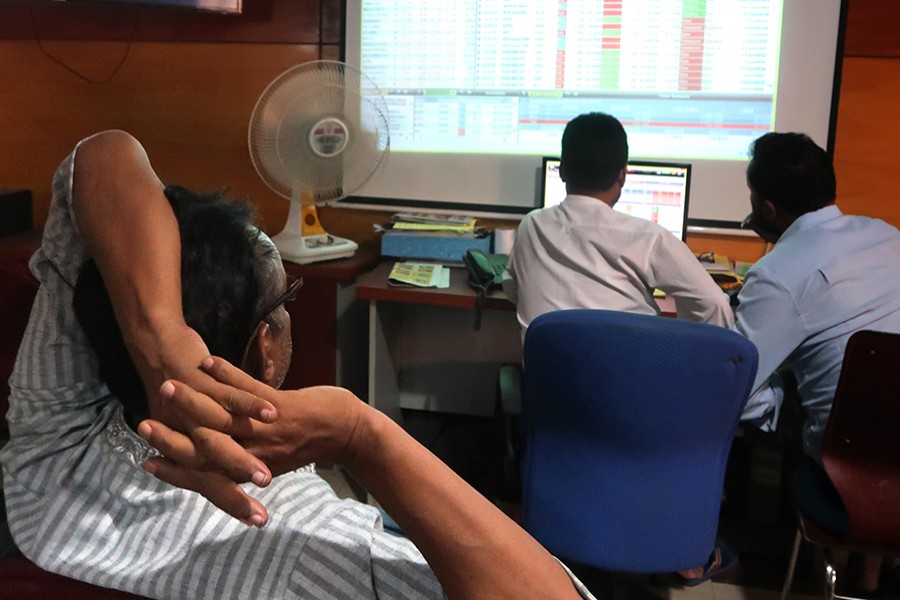The central bank has announced a fresh policy for providing temporary liquidity support to the scheduled banks for boosting their investment in the country's ailing capital market.
Under the new policy, the banks will be eligible to invest such liquidity only in their own portfolios or the portfolios of their subsidiaries as loan, according to a notification, issued by the Bangladesh Bank (BB) on Sunday.
The banks, interested to avail such temporary liquidity support from the central bank, will have to open separate beneficiary owners (BO) accounts afresh in this connection.
The banks concerned will be allowed to enjoy such liquidity support with their treasury bills (T-bills) and bonds using repo (repurchase agreement) mechanism.
The BB's latest policy support came against the backdrop of a falling trend in the share market in the recent months despite the government's various measures.
The DSEX, the core index of the Dhaka Stock Exchange (DSE), has lost a cumulative 462 points in the past three months, and the market capitalisation shed about Tk 220 billion during the period.
The key index of the prime bourse tumbled to a fresh 33-month low on September 18, as the government's recent measures failed to boost investors' confidence.
"The banks may avail such opportunity to increase their investment in the share market," a senior official of the BB told the FE regarding the policy support.
Senior bankers also welcomed the latest move, saying it is a good initiative of the central bank for supporting the capital market.
"But the banks' fresh investment in the share market will depend on their exposure in the market and their risk appetite," Syed Mahbubur Rahman, Chairman of the Association of Bankers, Bangladesh (ABB), told the FE while explaining possible outcome of the move.
He also said the stock market regulator and the market operators should play their due roles to bring dynamism in the market on long-term basis.
The central bank will provide the liquidity support to the banks by keeping 5.0 per cent margin of repo value of the T-bills or bonds in case of failure of repo cash settlement by the banks concerned, according to the BB official.
The tenure of the repo may be extended up to six months on the basis of successful use of the fund by the banks. The repo interest rate is fixed at 6.0 per cent.
Applications will be submitted to the general manager (GM) of the BB's Department of Off-Site Supervision (DOS) with statement of BO accounts for renewal of such liquidity facility before five days of the repo expiry.
Besides, the interested banks will have to file applications to the BB DOS GM, mentioning the required amount of liquidity support with relevant documents within three months from the date of issuing the notification.
Another official of the BB said the banks will have to comply with the provision of their exposure limit in the share market, if they are interested to enjoy the liquidity support.
Most of the banks, however, still have scopes to invest more in the share market in line with the existing rules and regulations, according to the central banker.
"The banks' exposure in the share market is still below 15 per cent instead of the permissible limit of 25 per cent of their total eligible capital components in the market," the BB official explained.
Under the existing provision, the banks are allowed to invest maximum 25 per cent of their total capital in the share market on solo basis in line with the Banking Companies (Amended) Act 2013.
The market value of total investment of a banking company in the capital market on consolidated basis will not exceed 50 per cent of the sum of its consolidated paid-up capital, balance in share-premium account, statutory reserves, and retained earnings - as stated in the latest audited financial statements.
According to the act, total capital comprises of four components: paid-up capital, balance in share premium account, statutory reserves, and retained earnings - as stated in the latest audited financial statements.
While calculating a bank's total investment in share market, different components, including all types of shares, corporate bonds, mutual fund units and other capital market securities, will be taken into account.
In July, the central bank advised around 20 commercial banks to boost their investment in stocks for revamping the ailing capital market.


